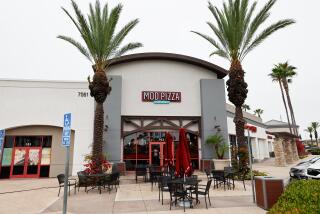Food-Service Entrepreneur Stands the Heat : Management: Kathy Taggares diversified into the frozen pizza business when her salad dressing product hit a slump. The move has paid off for K.T.’s Kitchens.
- Share via
GLENDALE — Kathy Taggares kept reading about entrepreneurs who’d built businesses from nothing and she wanted to join the club.
So seven years ago Taggares sold everything from her jewelry to her condominium to help raise enough money to help buy a salad dressing company from Marriott International.
She renamed the business K.T.’s Kitchens, and when the salad dressing business hit a slump, she jumped into the frozen pizza market. It’s paid off.
Under her stewardship, K.T.’s sales have jumped from $8 million to $26 million last year, and employment has jumped from 16 to 450. Even Taggares concedes she didn’t get this far without having some bad days. Why just recently she lost her temper and threw a frozen pizza against the wall.
But that kind of strong will may have kept Taggares’ company growing during the recession because, “She knows how to get (the) product out the door. She doesn’t know what the word no means,” said Lloyd Greif, president of Greif & Co., a Los Angeles investment banking firm.
Greif said K.T.’s Kitchens also prospered because of Taggares’ good business instincts, by diversifying into the pizza business to lessen its dependence on the salad dressing market. “She has an intuitive feel for the marketplace,” Greif said. And Taggares is “a relentless salesperson,” he said.
Taggares also recently won the U.S. Small Business Administration business person of the year award for California.
Taggares decided to run her own business after a seven-year stretch as a sales and marketing manager with food processing companies, when she became fed up with inadequate pay and recognition.
Marriott, the hotel and food services chain, had a business it wanted to shed, Bob’s Kitchens in Glendale, maker of Bob’s Big Boy salad dressings and dips. The only hitch: Marriott was willing to carry a note for $5 million, but Taggares also had to come up with $1 million in cash.
Taggares talked to California First Bank, and got about a $700,000 loan based on the plant’s inventory and receivables. For the rest Taggares sold her condominium, car, life insurance policy and jewelry. But she was still a bit short. So, Taggares collected the balance by selling a hamburger patty maker in the factory she didn’t own yet to make up the difference.
But getting to where the company now is hasn’t been a snap. K.T.’s salad dressing business, the onetime company stronghold, has slipped dramatically.
When Taggares bought the block-long factory in Glendale, she gained exclusive rights to manufacture Bob’s Big Boy salad dressing and dips sold at the family restaurant chain’s California locations and in supermarkets. But after the purchase, Marriott sold the Bob’s California restaurants to Restaurant Enterprise Group (now Family Restaurants Inc.), which has converted some into Coco’s and Carrows, and sold others.
While the Bob’s salad dressings have been--and remain--a high profit margin business, the Bob’s restaurant selloff hurt K.T.’s sales. Marriott wasn’t promoting the Bob’s brand anymore, and K.T.’s didn’t have the financial resources to support it with big advertising.
Trying to reverse the trend, K.T.’s experimented with fat-free variations and expanded into new markets. But it didn’t help. Taggares concluded that Bob’s salad dressings--its cash cow--would no longer be the company’s mainstay. “I want to keep the brand alive. I see it as a steady business, but I don’t see any major increases there,” said Taggares.
*
When K.T.’s got into the frozen pizza business in late 1988 Taggares went out and contacted supermarket food buyers herself. Pizza has become K.T.’s most potent revenue source.
K.T.’s supplies frozen pizzas for various supermarket labels such as Vons and Albertson’s, plus the Price Costco warehouse club stores, and for military bases, hospitals, amusement parks and schools. It also packs the Wolfgang Puck’s California frozen pizza.
K.T.’s now pumps out an average of 300 frozen pizzas a minute on a conveyor belt assembly line at its Glendale plant. After the crust is baked it journeys through a waterfall of sauce and cheese, then toppings, such as pepperoni and sausage, are added by hand and by machine, then are frozen. Within 48 hours the pizzas have been shipped around the country.
Annual pizza sales stand at $20 million, and Taggares boasts that pizza sales will grow another $10 million this year.
The timing seems to be right. U.S. consumers spent about $1.4 billion on frozen pizza in 1993, with sales rising 7%, according to Chicago-based Information Resources Inc. In contrast, supermarket frozen foods sales in general have been flat.
Steven C. Anderson, president of the American Frozen Food Institute in McLean, Va., believes frozen pizza’s popularity reflects the rise of busy, two-paycheck households who demand convenience. The limp economy may also be a factor since private label frozen pizza remains a relatively low-cost meal, Anderson added.
But Taggares has run into some problems too.
In 1993, K.T.’s International, another division of the company, developed a line of vending machines that keeps frozen food frozen and dispenses it hot.
Anxious to push sales, K.T.’s International hooked up with a telemarketing executive who, according to a suit recently filed by the Federal Trade Commission, was bilking small investors. Taggares’ company was not cited by the FTC case. But Taggares said K.T.’s had to shell out $250,000 in legal fees, plus it lost several hundred thousand dollars in inventory.
In a sense, Taggares has been around the food industry most of her life.
Taggares, 42, hails from Othello, Wash., a tiny potato farming community with one stoplight. She enrolled at New York University as a dance major. To support herself, she tended bar and waited tables. It was an inauspicious start in food service.
Today her trusted lieutenant is Joan Paris, a former colleague and friend of 20 years. Paris is now K.T.’s general manager. The Taggares-Paris management team apparently works well. Taggares admits she has a short fuse; in contrast, Paris is calm and steady.
Taggares hopes to open a second factory on the East Coast to cut shipping costs. Taggares has already started scouting possible sites in Kentucky, Ohio and the Carolinas.
In the early days at K.T.’s, Taggares spent lots of time on the factory floor. She still strolls through regularly, but as the business has grown, she’s learned to delegate.
More to Read
Inside the business of entertainment
The Wide Shot brings you news, analysis and insights on everything from streaming wars to production — and what it all means for the future.
You may occasionally receive promotional content from the Los Angeles Times.










